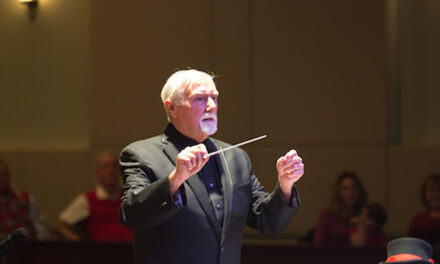For once, even the inescapable rumbling freight train co-operated! It shook Whitley Auditorium during the playing of “The Alcotts,” from Piano Sonata No. 2: Concord, Mass. (1840-1860), by Charles Ives, probably the only composer who would have relished the addition to the sonic collage. Other elements in this mix are evocations of the Alcott children “playing at” Beethoven’s Fifth Symphony with “lots of wrong notes” and snatches of hymns and gospel songs. This year’s Adams Foundation Artist, Steven Mayer, mentioned these elements during brief comments describing this five-minute “impression of a summer evening in Concord.”
This was the only tranquil part of the second half of the remarkably satisfying October 9 concert. Meyers’ own transcription of “The Masque” movement from Leonard Berstein’s Age of Anxiety was quite an achievement, having condensed this scherzo for piano and percussion alone into a piece for solo piano. Described by Edward Downes in The New York Philharmonic Guide to the Symphony as “employ(ing)… a kind of fantastic piano-jazz, by turns nervous, sentimental, self-satisfied, [and] vociferous,” this was a wonder to see as well as to hear.
The concluding part of this unconventional program would have made a terrific DVD: just watching all the virtuosic crossed hands and incredibly fast fingerings of a major pianist cutting loose on “‘T’ain’t Nobody’s Bizness” (1929) of Fats Waller and four selections by Art Tatum was breathtaking! Mayer explained that Waller’s contract specified that he would “never play boogie-woogie.” He also said that while Tatum, who was blind, had never formally studied classical music, the form was “close to his heart,” citing as an example of this his Variations on Massenet’s “Elegy.” “Tatum’s Pole Boogie” was as much a showpiece as anything by Liszt. The joint got “jumpin'” with “Get Happy,” “St. Louis Blues,” and “Hold That Tiger!” At the post-concert reception, Mayer said that he had transcribed some of the music from Tatum’s own commercial recordings.
My ears are still ringing from Mayer’s encore, Louis Moreau Gottshalk’s famous “Le banjo.” About the latter, Irving Lowens and S. Frederick Starr, writing in New Grove II , draw attention to “startling pre-echoes of Ives (that) can be heard in Gottschalk’s frequent use of quotation as both a musical and a psychological device, a typical instance of which may be found in ‘Le banjo,’ where ‘Roll, Jordan, Roll’ and Stephen Foster’s ‘Camptown Races’ are quoted to excellent effect.”
The concert opened with a gentle and melancholic performance of Mozart’s Rondo in A Minor, K.511. Mayer followed this with a very sensitive and unusually cohesive realization of Robert Schumann’s Carnaval , Op. 9. Described in the score as “Jests on four notes,” all the variations make use of a four-note motto except for the opening Preamble. Mayer said that the addition of extra-musical titles, such as commedia dell’arte characters, the composer’s friends such as Chopin and Paganini, and Schumann himself, in the guise of Florestan and Eusebius, were added after it was composed.
At the beginning of the concert, Mayer said he would add an extra surprise to the program in honor of Horowitz’s birthday. This was played at the end of the first half. I believe he misspoke when he identified Rachmaninov as the author of the brazen and no holds barred transcription of Liszt’s Fifteenth Hungarian Rhapsody, “Rákóczy March.” All my online searches indicate that Horowitz used multiple versions of the scores by Liszt to make his own transcription.
I doubt that Elon’s wonderfully restored 1923D Steinway has ever been so fully exploited from rich rumbling bass notes to the brightest treble and with its ivories fingered every imaginable way. At the reception, Mayer spoke glowingly of the instrument and the hall saying that it had been “one of his most satisfying performances.”
Mayer first commanded widespread attention with a performance of Leon Kirchner’s Piano Concerto No. 2 at the 3rd Carnegie Hall International American Music Competition. His world premiere recording of Liszt’s Concerto, Op. Posth., and “De Profundus,” with the London Symphony under Tamas Vasary, on ASV, won the 1992 Grand Prix du Disque Liszt. Another ASV CD recreates a famous contest between Liszt and Thalberg (misspelled in the program notes). For Naxos, he will record the complete piano music of Charles Ives and music by Liszt, Heinrich, Farwell and Nevin, among others.











